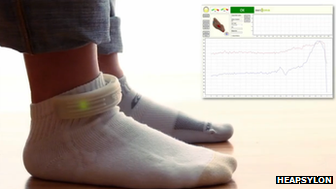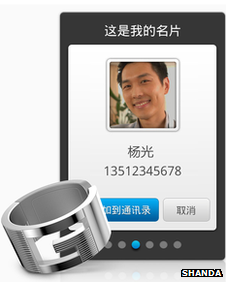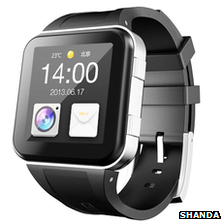Geak Ring and Sensoria socks add to range of wearable tech
- Published

Heapsylon says its Sensoria socks could prevent running injuries and other foot-related problems
Smart socks and rings are among the latest wearable tech to be announced.
US-based Heapsylon says it is developing sensor-equipped socks that help their owners monitor their balance while walking or running.
Meanwhile, Chinese company Shanda has unveiled the Geak Ring - a finger-worn device that can unlock a user's smartphone or pass data to others.
Credit Suisse has forecast the market in wearable tech could be worth $50bn (£32bn) in five years.
That would be more than 10 times its current value, making it a "mega-trend", said the bank.
"[It is] profoundly altering how we interact with our technology, our environment and each other," it added in a research note.
But others have warned that during this time of experimentation, many products will likely end up flops.
Washable sensors
The three co-founders of Heapsylon originally worked for Microsoft's Xbox and health software divisions.
They say their Sensoria socks have sensors built into their fabric to measure pressure readings in order to provide data about how their owner walks or runs.
The socks attach to an ankle band that then communicates the gathered data via Bluetooth to a smartphone or computer running the firm's software.
The developers say the washable product could provide real-time feedback to runners, allowing them to adjust their strides to reduce the risk of injury.
In addition they say the product could be used to help monitor diabetic foot ulcers or warn of elderly patients losing their balance to alert carers they are at risk of falling.

Shanda says the Geak Ring can be used to pass contact details to friends
The firm's boss, Davide Vigano, told the Bloomberg news service, external that "we want to become the GoreTex of embeddable computing".
But for now the product only exists as a prototype. The firm hopes to bring it to market via a fundraising campaign to be launched on Indiegogo later this week.
Tap to unlock
Shanghai-based Shanda's Geak Ring uses an NFC (near field communication) chip to identify the accessory.
The firm says this can be used to unlock its range of Android smartphones by tapping the two together as an alternative to keying in a password. It aims to make the ring compatible with other manufacturers' phones before the end of the year.
In addition it says the device can trigger downloads of the owner's photos, contact information and other data on to friends' handsets by touching them against the ring.
It adds that the device should last for 99 years and does not need to be charged.
The firm has also unveiled an Android-powered watch offering a range of wrist-worn apps including weather forecasts, exercise feedback and a remote control for smartphone cameras.
Shanda says it will start taking pre-orders from China-based consumers for the watch in July and the ring the following month.
'Ripe for exploration'
The biggest segment in the existing wearable tech market is currently fitness trackers, with Nike's Fuelband, Jawbone's Up and Fitbit's Flex among the leading products.
However, interest in Pebble's smartwatch and Google Glass - which places a small Android-powered screen in front of the wearer's right eye - is fuelling forecasts that the sector is set to boom.

Shanda has also announced a watch that is compatible with the Geak Ring
Samsung has confirmed it is also working on a smartwatch concept, and reports have suggested Apple and Microsoft also have such products in development.
However, Apple's chief executive Tim Cook - who also sits on Nike's board - recently warned that "wearables" had problems to overcome.
"There's nothing that's going to convince a kid that's never worn glasses or a band to wear one," he said at a conference organised by the AllThingsD tech site last month.
"So I think there's lot of things to solve in this space, but it's an area where it's ripe for exploration."
The Juniper Research consultancy also warns that the wearable tech market is still in its early days and that some of the smaller firms getting involved might not survive.
"Take-up of any new technology will be low at least in the short to medium term," Nitin Bhas, senior analyst at the firm, told the BBC.
"If a player like Apple or Microsoft entered the smart wearable segment it would feed demand as they would publicise such products, educating the average consumer.
"But it will still take some time for such devices to go mainstream - perhaps not until 2016 or 2017 - and it will be difficult for smaller firms in the meantime."
- Published9 January 2013